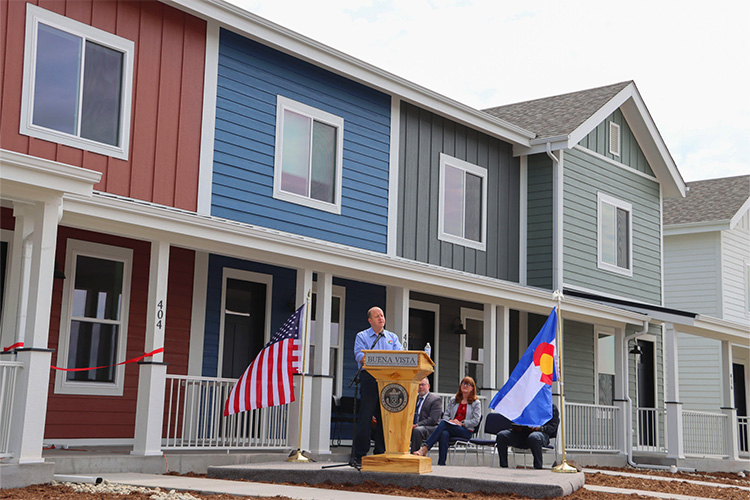
Governor Jared Polis gives a speech in front of newly-built housing projects in Buena Vista. photo courtesy of the governor’s office
A summary of recent solutions being implemented to prevent the housing crisis in Colorado.
According to Maslow’s hierarchy of needs, shelter is one of the most important things for humans. But over the span of a decade, homelessness has increased by 150% according to the Colorado State of Homelessness report for 2023. This number is staggering and it is not just a statistic, but the reality of thousands of people across the state and millions within the country. This is not just a problem of money, but of supply. Not enough houses are available on the market, causing prices to rise and preventing people from affording a home. It is safe to say that the situation is becoming a real problem and something needs to be done about it.
Following the stock market crash in 2008, housing prices fell, putting a halt on development. This lack of supply caused the costs of homes to increase. For the people who already owned a house, this was a good thing. If a house was worth $500,000 when it was bought, and $800,000 when it was sold, then the seller made a profit. However, if someone doesn’t own a house, then they have nothing to supplement that cost before they are able to sell it, meaning that as the prices increase, the less likely people are to afford a house. This, in combination with basic laws of supply and demand, have created a situation where many people across the country are lacking housing stability.
Fortunately, the Colorado government is committed to making a change. The Department of Local Affairs (DOLA) and other state agencies have worked tirelessly to build sustainable and affordable housing within the state of Colorado. One of the ways they are doing this is by proposing amendments to the Colorado constitution for voters to decide upon. In 2022, the State Affordable Housing Fund was implemented, otherwise known as Proposition 123. Robyn DiFalco, an employee at DOLA, describes the details of the proposition, explaining that, “it created a funding program that supports construction of affordable housing. It also sets up some requirements in order to be eligible for that funding.” This means that if the local governments in Colorado can increase affordable housing by 3% each year, then they have access to the funding to build said housing.
The problem occurs when elected officials choose not to make these changes in fear of losing the support of the people. Following World War 2, the government built lots of single family homes in the suburbs and allowed for white people to move in. Many of these neighborhoods are still segregated like this, and some of the people who live in them do not want the affordable housing projects next to them because it reduces their property values and diversifies their communities. DiFalco said that, “the challenge that we work with local governments on, is how to undo this problem; how to change the policies that separate different kinds of people and different kinds of housing.” Elected officials know what their communities want and are not likely to make the changes necessary, furthering the housing crisis.
Progress is slow but steady, and change is just around the corner. In the November election, Ballot Issue 2R is on the Denver ballot, which would raise sales tax by five cents for every ten dollars spent. This money would go towards building affordable housing units and The Colorado Sun details that “Denver city officials say Ballot Issue 2R could generate upward of 40,000 affordable units over the next decade.” The cost of having people live on the street is actually higher than this increase on sales tax would cost the average citizen. Staying informed about ballot measures and propositions in one’s community is important to being an educated voter, so individuals need to make sure that they are doing their research.
Housing is important. In the words of DiFalco, “We need apartments. We need condos. We need townhomes. We need single family homes, and we need shelters. And we need permanent supportive housing, which gives people wraparound services when their lives fall apart and they have addiction issues.” Housing should be a right, but instead, many people treat it as an investment. Those who can afford to enter the market are rewarded by rising prices and a roof over their heads, but for those who can’t, the housing market is just pushing them further away. By voting in the election and donating to affordable housing organizations, individuals can help to reduce this gap and give everyone the equal opportunities that they deserve on the basic human right to housing.